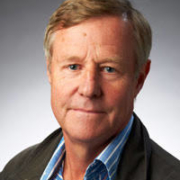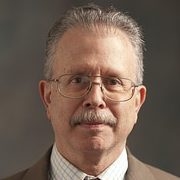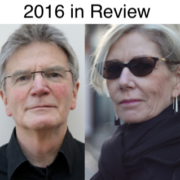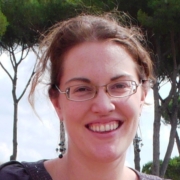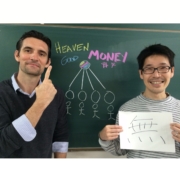Elizabeth Popp Berman
Thinking like an Economist
Today we explore the ways in which economic thinking came to dominate public policy. With me is Beth Popp Berman, who has recently written the new book Thinking like an Economist: How Efficiency Replaced Equality in US Public Policy. Beth Popp Berman is an Associate Professor of Organizational Studies at the University of Michigan.
Citation: Berman Popp, Elizabeth interview with Will Brehm, FreshEd, 276, podcast audio, April 4, 2022 https://freshedpodcast.com/popp-berman/
Will Brehm 0:52
Beth Popp Berman, welcome to FreshEd.
Elizabeth Popp Berman 0:54
Thank you, Will, so much for having me on the show.
Will Brehm 0:56
So, when we think about economists today, you know, we often connect them to public policy. They are sort of essential in government, in many ways to give economic analysis is part and parcel of what public policy in many ways is today. But when did economists actually start working in government and in the halls of government? When did they first appear there?
Elizabeth Popp Berman 1:17
Economists actually have a pretty long history of working in government. They really began to start to make contributions as early as World War I and sort of solving technical problems for the government. And then over the 20th century, what ended up happening is you sort of have waves of different economists who become influential at different moments in time. And so, the first big wave is with economists who came to power during the FDR administration. And so, in this era, you have a type of economist who’s quite different from what we think of as economists today. They are these institutionalist economists, and FDR relied on them for advice about how to structure the new deal, about how to deal with the Great Depression. And they were really interested -they did a different type of work than what we think of as economics now. So, they used a lot more words and a lot less math. They were interested in the specificities of law and of social institutions, and they were interested in economic problems in a way we might today talk about as, like, political economy or something much broader. So, they came to influence for a while. And then a couple of decades later, you have a different set of economists who start to become influential. And so, these are the Keynesian economists. And I think that often they’ve received a lot of historical attention. And often when we think about economists as deciding, do we need some kind of fiscal stimulus, you know, how do we manage the unemployment rate? They are the kinds of economists who are dealing with those questions, and they really became influential mid-century.
Will Brehm 2:40
And what are some of the big differences between these institutional economists and Keynesian economists?
Elizabeth Popp Berman 2:45
Well, the Keynesians were already beginning to become somewhat more mathematical. So, that is a piece of it. They’re sort of operating from a different intellectual framework. They’re also really specifically focused on the macro economy, right. So, the capital E economy and how to manage that. You know, the Institutionalists, were a little bit broader in their interests. But in some ways, I think you can think of the Keynesians as sort of the more technical descendants of the institutionalists. They were developing more sophisticated models for thinking about how the economy worked, but they still had a lot of the same core concerns and were interested in sort of using economics to make government work better.
Will Brehm 3:22
Okay. So, it wasn’t about getting rid of government in any way. You know, with these Institutionalists and these Keynesian economists over that 20-30 year history, maybe a bit longer. Are there any sort of remnants today of what they created back then in terms of institution or ideas? You know, do they still have influence today, in a way?
Elizabeth Popp Berman 3:41
Yeah. Well, the Institutionalists are largely themselves gone. Things that they built that still exist. So, Institutionalists founded the Brookings Institution, for example, which is obviously still a very influential think tank. They created the National Bureau for Economic Research, which still is the organization that publishes all the economics preprints that gets circulated. But they’ve been supplanted over the years by different types of economists as the profession has changed. The Keynesians have evolved -the evolution is less drastic, right? People still might call themselves Keynesians, broadly speaking, and the kinds of influence and debates that they were having are still in play today, in a much more direct sense. That lineage is much more continuous.
Will Brehm 4:23
In your book, you show how John F. Kennedy was a big proponent of economic expert analysis in his public policy making. Why was John F. Kennedy so taken by economists?
Elizabeth Popp Berman 4:37
Honestly, I really think it was personality as much as anything. I mean, obviously, he had these personal ties to Harvard. You know, he was a Harvard man. He had written a book as a young man. And he really developed some of his support from people who were on the Harvard faculty even before he was elected. And then once he was elected, really brought those people into influence with him. But at the same time, a lot of it was just the kind of person he was. He liked learning about stuff from academics, he took what they had to say seriously and really used it to guide his policymaking.
Will Brehm 5:09
What sort of economic ideas influenced him during his short time in office?
Elizabeth Popp Berman 5:14
When Kennedy was in office it was sort of the peak of this Keynesian macroeconomics type of influence. And so, Kennedy had a Council of Economic Advisers, which is three people who were appointed in the White House. And they were probably the most influential Council of Economic Advisers that any president has ever had. So, they were doing things like advising him on when to cut taxes to stimulate the economy. But they were also starting to introduce ideas like human capital theory and the idea that if we invest in people then that can help to increase their incomes. And they use that to pretty directly motivate the war on poverty, for example, which was just kind of being put into place at the time that Kennedy was assassinated.
Will Brehm 5:54
And so, after Kennedy was assassinated, Johnson really takes forward this war on poverty. So, does he also take forward the reliance on human capital theory and other ways of sort of economic thinking?
Elizabeth Popp Berman 6:05
It’s a little bit more complicated under Johnson because Johnson did not have the same kind of respect for expertise that Kennedy did. It was almost the opposite. You know, he saw himself as sort of an outsider and a representative of the common man and kept the experts around but did not rely on them in quite the same way. But at the same time, in a lot of ways, the Johnson administration was really the one where economics in something closer to a sense that we know it today really became influential. And it was in the Johnson administration that not only did you have economists influencing macroeconomic decisions, which if anything, they did a little bit less during the Johnson administration than under Kennedy’s. But here’s where you really have economics, and specifically microeconomics, branching out and starting to influence new kinds of policy areas, particularly social policy areas.
Will Brehm 6:55
So, what does that look like? What does it mean for microeconomics to influence social policy areas?
Elizabeth Popp Berman 7:02
So, this is really a whole sort of story of its own of how a particular set of economists came to influence during this period of time. And these economists came from a place called RAND (Research and Development) Corporation, which probably education researchers are certainly familiar with, right? And at the time, RAND was purely a defense organization. So, it was solving problems for the Air Force and economists were some of the people that it used to do that. And so, these economists were interested in problems of optimization. And so, they started out as answering questions like, how do we most cost effectively try to protect ourselves against nuclear strike under various circumstances? But they really developed greater ambitions than this. And even before RAND had any kind of formal program beyond defense, they were starting to look at areas like education policy. Education was one of the very early areas that they looked at to really try to think about how more efficient decisions could be made in those areas as well.
Will Brehm 7:02
This notion of efficiency and cost-effectiveness to optimize whatever you’re trying to do. This really came about from RAND? Like government policymakers didn’t necessarily think about issues of cost effectiveness prior to that?
Elizabeth Popp Berman 8:14
They did but not in the same way. At some level, obviously, people have always been thinking about how much something can cost before they actually wrote it into law. But for the most part, they did not think about it in this sort of systematic way of, let’s figure out what it is that we’re trying to achieve? How much is it going to cost us to get there? and how can we reach that goal at the minimum possible cost? And where there was some history of this, interestingly, was in water resources policy. So, building dams, basically. And so, in water resources policy, people had been thinking about costs and benefits in more formal ways for a much longer period of time. But they weren’t doing it in quite the way that the economists were. And the economists basically thought their way was better and sort of convinced everybody else to adopt their way as well. But they also took it in lots of different directions, right? They weren’t limited to building dams.
Will Brehm 9:03
How did the economists at RAND and working with defense, how did they actually then sort of spread their ideas of cost effectiveness and efficiency much more widely than the military and maybe beyond dams, as well in water management?
Elizabeth Popp Berman 9:20
The critical step was really first they moved to the Defense Department. So, at the beginning of the Kennedy administration, Kennedy appointed Robert McNamara to be Secretary of Defense and McNamara himself, who had sort of implemented a lot of cost effectiveness techniques at Ford, you know, that was sort of what he was known for, I really found that this approach to thinking about decision-making appealed to him, it resonated. He brought the RAND folks to the Defense Department, and they implemented a lot of these methods there, you know, later quite controversially, because, you know, a lot of the Vietnam War was driven by some of this kind of thinking as well. In the early 1960s though, this was still seen as being very successful within DOD. And so, in 1965, Johnson said, let’s roll this out everywhere. This is a way that we can think about controlling costs more effectively ensuring we’re getting more bang for our buck, let’s ask every agency that we’ve got to use this kind of system. And that was really the thing that started to spread it into other kinds of policy domains.
Will Brehm 10:20
Did it work? I mean, with hindsight, were these different agencies becoming more cost effective?
Elizabeth Popp Berman 10:27
Yeah. It was terribly ineffective at what it actually hoped to do. But it was very effective at disseminating this way of thinking about how we should make decisions to this much broader range of spaces. But no, it was never very effective. Agencies didn’t know how to think this way. The US Geological Service has this lovely document where they talk about, “We don’t even know what our goals are. What is it that we’re supposed to be trying to maximize here”? And then also, it really was an approach that ignored politics, right? And so, a lot of times the budgeting decisions were getting made as people negotiated behind closed doors. And this sort of cost effectiveness analyses were just window dressing for that larger process that was going on.
Will Brehm 11:10
So, what sort of remnants from that period where, although they weren’t able to make huge changes to the effectiveness, or the cost efficiency of different agencies, what sort of remnants still exist today from that era?
Elizabeth Popp Berman 11:24
There were at least three big changes that came as a result of that. One was that these sorts of policy analysis offices were created in all the big executive agencies. And those tended to last even after this budgeting system, which was called PPBS (Planning-Programming-Budgeting System), sort of stopped being used around 1970. But the offices typically were headed by economists who were organized around this kind of economic thinking. And in later years, they would go on to introduce a lot of different kinds of policy innovations to their agencies that were not about budgeting necessarily. But for example, at the EPA, the sort of descendant office of this was the one that first introduced the idea of emissions trading, right? So, other kinds of ideas that came from economics were disseminated through these offices. But they also led to the growth of a whole set of think tanks that were organized around economic reasoning. And so, the demands of PPBS, the budgeting system that was introduced, created a lot of demand for other kinds of analysis. And so, you have institutions like the Urban Institute was founded as a very direct outcome of this shift. Places like Mathematica went from being very tiny little organizations to fairly large policy analysis places by doing the kinds of analyses that government now wanted to have done. And then the last big way that they really had very lasting impact were by leading universities to create public policy schools, which did not exist before this, and which really created a whole generation of people who learned to think in this broad way about policy problems, and then would go on to have careers in government.
Will Brehm 13:03
It’s so fascinating, because today, in a lot of the conversations I have about education policy, there’s never a time when I don’t hear something about cost effectiveness of different programs when we think about planning, and when we think about budgeting. Although people might challenge it. It’s so present. And it would be strange if it wasn’t there in a way now. And reading your book, I sort of realized how commonplace that really is, you know, quite amazing.
Elizabeth Popp Berman 13:28
Yeah. And I think that’s one of the things that was really hard to convey is just -it’s so natural to us now as a way of thinking about problems that it’s really hard to wrap your head around the idea that nobody did, right. And, you know, there’s some nice examples in there of William Gorham, for example, who went on to found the Urban Institute, he led one of these policy offices at what was then called the Department of Health Education and Welfare. And he went around and talked to people about what it was that they did because he wanted to try to figure out how to make their programs more cost effective. And he just expressed being so frustrated that he would ask people, for example, who were trying to increase literacy rates, well, what is it that you’re trying to do? We’re trying to increase literacy. Well, how do you measure that? They’re like, well, we don’t really measure that. We have records of attendance, we know how many people came to the class. But that wasn’t what he was talking about. And the way of thinking about the problems as, here’s our goal, let’s make the goal measurable, let’s think about what kind of path we can use to get to that goal as efficiently as possible, was just totally foreign.
Will Brehm 14:29
And one of the points you make in your book is that this new way of thinking about social policy and thinking about certain planning problems that then could be sort of worked through to try and reach that goal, that it actually contains values, right? There’s value judgments being made even if it seems sort of neutral and knowledge-based and, research-based, there’s actually certain values underlying some of these principles to notions like efficiency and optimization. So, what are some of those values that you sort of highlight?
Elizabeth Popp Berman 15:02
Well, I think at one level, it’s important to recognize that efficiency itself is a value, right? That the idea that what we should be trying to do is maximize some outcome at minimum cost or with minimum resources -that is itself a preference. And where you see issues and conflicts is that that really does sometimes conflict with other things that we might be trying to achieve. So, for example, sometimes we’re doing things because we value stability. So, we might not want to make, I don’t know, to completely deregulate the banking sector even if it might theoretically make things more efficient because the cost of having some kind of crisis would be so high that that would be a really bad outcome. And so, in that case, efficiency might not want to be the thing you’re trying to achieve. But in areas like education policy, efficiency can often be in tension with equality, right? And the way to achieve the most cost-effective results are not necessarily the ways that are going to result in the most equal outcomes. I think the other thing that’s important to recognize is there’s sort of different definitions of efficiency in here. But many ways of thinking about efficiency, also really emphasize maximizing net benefits without really dealing with the question of net benefits for whom. A policy that looks very good on a cost benefit analysis might theoretically have all the benefits going to the very wealthy and all the costs going to the very poor. I think this happens, for example, when you look at power plants that might be very polluting in their local communities but are making a lot of money for somebody. And so, there’s ways in which the tools themselves can often have biases, biases towards the wealthy sort of baked into them from the beginning.
Will Brehm 16:42
Yeah. It seems like there’s despite being technocratic in a way and you know, just a method of budgeting, or a method of planning, but actually containing a particular political orientation. And that orientation isn’t sort of revealed. It’s sort of hidden.
Elizabeth Popp Berman 16:58
Yeah. And I think that’s part of why it’s successful as it is because it’s useful for making decisions. It does get you a set of tools for actually comparing and making some of these difficult decisions. But it also has this appearance of being neutral. The values that it contains are kind of below the surface a little bit. They’re not as explicit as if you say, well, we’re going to prioritize things that help poor people, or rich people, or any particular group of people. Yeah. So, these values end up kind of going hidden under the surface because they’re not so evident when you first look at it.
Will Brehm 17:30
And what’s so surprising is that you make clear in your book that this way of thinking about social policy and public policy was really advanced under democratic presidents in America, particularly Jimmy Carter, of all people. The man who is now building houses for Habitat for Humanity. You know, this really kind gentleman, under his presidency, we see this thinking just become predominant sort of throughout the public policy world. So, how do we explain that sort of reality where it’s under the democratic presidents that supposedly would be interested in issues of equity and reaching the poorest people yet are embracing logics that, as you say, that might have values other than equity and equality?
Elizabeth Popp Berman 18:17
Yeah. And I think one thing that’s important to remember, and that is kind of a takeaway from this book is that none of the kinds of economists, or the story that I’m talking about, is about people trying to eliminate government, people trying to get rid of government and free the market. It’s not coming from that kind of orientation. It’s coming from an idea of, Hey, we want government to do good things in the world. How do we make it do that better? We do it by making it do it more efficiently. And Carter in some ways, I think, was kind of like the first neoliberal. He’s an engineer by background. He’s sort of technocratic in his orientation. He finds this to be a comfortable way of thinking. But I think it also would be a mistake to put too much emphasis on him as an individual because you’ve also got a lot of broader political changes that are happening during the 1970’s. And there are a lot of other demands to try to think about, how do we trim. Even people who are sort of broadly pro-government, in some sense, are interested in, are there areas we can cut back? Or have unions gotten out of control? Those kinds of questions. And I think that’s part of what brings this kind of thinking to become more influential among democrats in this period.
Will Brehm 19:32
And it’s quite interesting to then think that after Carter, eventually comes Reagan and he was known for seeing government as the problem. It’s not about making government work more efficiently. It’s actually about getting rid of government in many sectors and parts of life. Like how did this economic thinking that you have described interact with the Reagan presidency?
Elizabeth Popp Berman 19:57
Yeah. Well, what really happens is that Reagan is much more strategic in how he uses economics. And so, while Carter sort of had this general respect for experts and listened to their advice, and may not have always followed it but they had a voice, broadly speaking, in his administration, Reagan’s administration was more guided by this underlying set of ideals about free markets and eliminating regulation. And he really was able to use economics in ways that he advanced it when it aligned with the kinds of policies that he wanted and he got rid of it when it didn’t. And so, for example, in environmental regulation, at the time, a lot of economists thought that there was too much environmental regulation. At the minimum, it needed to be made more cost effective. And the economics offices at places like the EPA did relatively okay relative to an agency that was seeing its budget slashed overall. But in some of the social policy areas with economists who were working on things like improving anti-poverty policy, those offices were just decimated because they were trying to make programs work better, more efficiently that Reagan basically thought shouldn’t exist in the first place. And so, Reagan was just much more selective about using economics when it aligned within his agenda and not using it or eliminating it when it didn’t.
Will Brehm 21:18
And with future presidents over the last few decades, do presidents sort of embrace that way of Reagan’s thinking where they sort of use economic thinking selectively when it aligns with your agenda? Or did they sort of take the sort of technocratic Carter approach where it’s just, this is the “proper way” of doing government, and I’m going to embrace this sort of economic reasoning?
Elizabeth Popp Berman 21:39
So, at some level, every president embraces economic reasoning selectively, right? It’s always secondary to political considerations. Everybody is more interested in the experts that happen to line up with their basic worldview and orientations. So, I think you do have to acknowledge that at one level. But there is this other level which the Democratic Party and Democratic administrations have been much more broadly accepting of economic expertise and have sort of allowed it in some ways to set and sometimes to constrain the policy agenda in ways that haven’t necessarily been the same in Republican administrations. And so, I think there are ways in which the Clinton administration and the Obama administration were very shaped by this broad economic style of reasoning that I talk about. And the kinds of policy solutions that they advocated for were grounded in economic thinking, and solutions that sort of came into conflict with that in some way tended to never really make it to the table in the first place. And so, that’s where I think you really see a divergence in how the two parties interact with economic reasoning.
Will Brehm 22:46
What would be an example during the Obama administration, this happened?
Elizabeth Popp Berman 22:49
Right, I think a great education example is Race to the Top as a sort of signal education policy. The idea that the way that we’re going to improve schools is we’re going to provide some pot of money and encourage competition, and people will compete in order to get this incentive, and that is the way that we can sort of incentivize schools to do better. And solutions that weren’t oriented towards thinking about test scores as the primary means of measuring outcomes were really just not taken seriously in the same kind of way. Everything had to at least start from the point that here’s what we’re trying to achieve, we’re trying to maximize test scores, how do we think about structuring policies that are going to do that as effectively as possible?
Will Brehm 23:34
What’s so interesting is that in the education world, a lot of the focus on this way of thinking about measurable outcomes and the connection to economics, the story typically goes back to the University of Chicago and people like Theodore Schultz, and Gary Becker, and Milton Friedman. And it’s sort of discussed in a way of this “neoliberal” sort of radical way of thinking. But you’re sort of articulating a very different story and narrative or history in a way, emphasizing less that sort of radical way of thinking and this more subtle way that ended up influencing a lot of institutions and ways of thinking that became commonplace but actually led us to some interesting outcomes. And it’s just a really interesting story to hear you sort of talk through.
Elizabeth Popp Berman 24:22
Yeah. And human capital theory is a great example of this, right? Because it did kind of have its origins with the University of Chicago and these economists who definitely had a very free market orientation to the world. But it started to move into policy, really, with Walter Heller, who was the chair of Kennedy’s Council of Economic Advisers. And it really had the kind of success that it had not because people like Milton Friedman advocated for it and said, “This is the only thing we’re thinking about” but basically because liberals came to embrace it as well and sort of think about schools are good because they are investments in humans that are going to increase their productivity in the long run. It’s good for individuals, it’s good for the economy. And that’s fundamentally why we have schools. And the reason that it has been so influential as a theory and as a way of thinking about education schooling is because everybody was essentially convinced that this was the right way to think about schools. And it’s not to say that there’s not truth to this as one perspective for thinking about what education is and what it does. But it becomes the only perspective. It becomes the only way you can think about how do we know if schools are doing what we want them to be doing
Will Brehm 25:31
Now, with the OECD, and the Program for International Student Assessment, and the World Bank, this notion, it’s not only in America, but it has really gone, in a sense, global. And you’re right, it’s so commonplace. It’s hard to even start having a conversation about education policy without thinking through some of these cost benefit analyses of education and schooling and quality of education. By way of conclusion, now that you’ve done such a nice sort of history and sociological study of this way of thinking in America in particular but I do think there’s connections outside of America here. Do you see any signs that we may be getting over this way of thinking in public policy? Or is this going to just be the way it is? I just wonder if we’re ever going to be able to get over this notion of efficiency and optimization.
Elizabeth Popp Berman 26:23
I mean, I think there’s certainly signs of change, right? I think every time we have some kind of crisis, you see indications of change, I think. After the 2008 financial crisis, there was a lot of soul searching within economics, and about economics, about policies. And then things kind of went back to the status quo in some ways. I think with the Trump administration, it sort of introduced a whole new kind of crisis. Having a president who really rejected the idea of expertise entirely made people ask new kinds of questions about what it is that they’re trying to do. So, I do think today, you see both more willingness to use frameworks that were traditionally outside of the bounds of what was seen as legitimate because people have a little less faith in those same old ideas. And so, I think it’s something like the idea of a Green New Deal here, where the solution to environmental problems isn’t just “Oh, we’re going to figure out how to price the externalities. We’re going to put a price on carbon”. Do these kinds of things. But thinking of environmental policy as a broad problem that has social components, that has components that are about employment, that need to focus on figuring out how to develop new technologies, and that really takes a much more multi-pronged approach to thinking about the problem. And I think you also see changes within economics too. And it’s going to be really interesting to watch how these play out. But there certainly a lot more interest in equality has developed within economics over the last couple of decades. And I think increasingly, economists are more willing to consider ideas that would have been maybe beyond the bounds of what seemed reasonable 10 years ago, or 20 years ago. And so, you see people doing work that is still certainly within the economics discipline and using the broad framing but that addresses things that weren’t seen as a problem until recently.
Will Brehm 28:07
Well, Beth Popp Berman, thank you so much for joining FreshEd. Really a pleasure to talk today. And congratulations on your new book.
Elizabeth Popp Berman 28:13
Thank you so much for having me.
Want to help translate this show? Please contact info@freshedpodcast.com
Guest Publications/Projects
The Relational Work of Student Loan Borrowing
Economics, Antitrust, and the Linked Evolution of the Academic and Policy Fields
The sociology of quantification: Where Are We Now?
How Academic Science Became an Economic Engine
Mentioned Resources
Institutional economics then and now
National Bureau for Economic Research
John F. Kennedy and his Council of Economic Advisers
Lyndon B. Johnson: Domestic Affairs
The Historical Roots of the Concept of Human Capital Theory
History of the RAND Corporation
Rand in Southeast Asia: A History of the Vietnam War Era
The Planning-Programming-Budgeting System (PPBS)
Historical Roots of the Public Policy Field
What did Race to the Top Accomplish?
The Chicago School of Political Economy
Program for International Student Assessment
Recommended
Walter Heller, Policy-advising, and the Kennedy Tax Cut
The Rand Corporation: Case Study of a Non-profit Advisory Corporation
The Development Philosophy of Robert S. McNamara
Government ideology and economic policy-making in the United States
The Presidency and Economic Policy
Balancing Fairness and Efficiency in an Optimization Model
The Consequences for Economics for Macroeconomics during the Past 60 Years
Have any useful resources related to this show? Please send them to info@freshedpodcast.com

